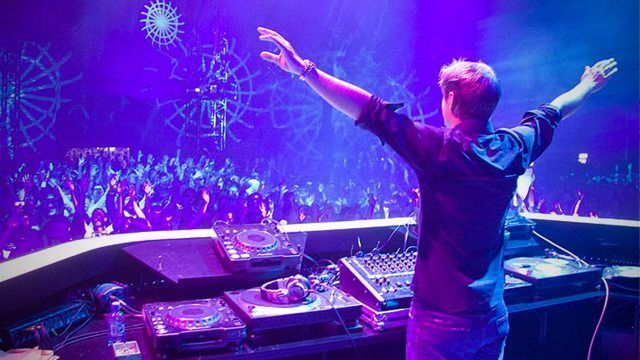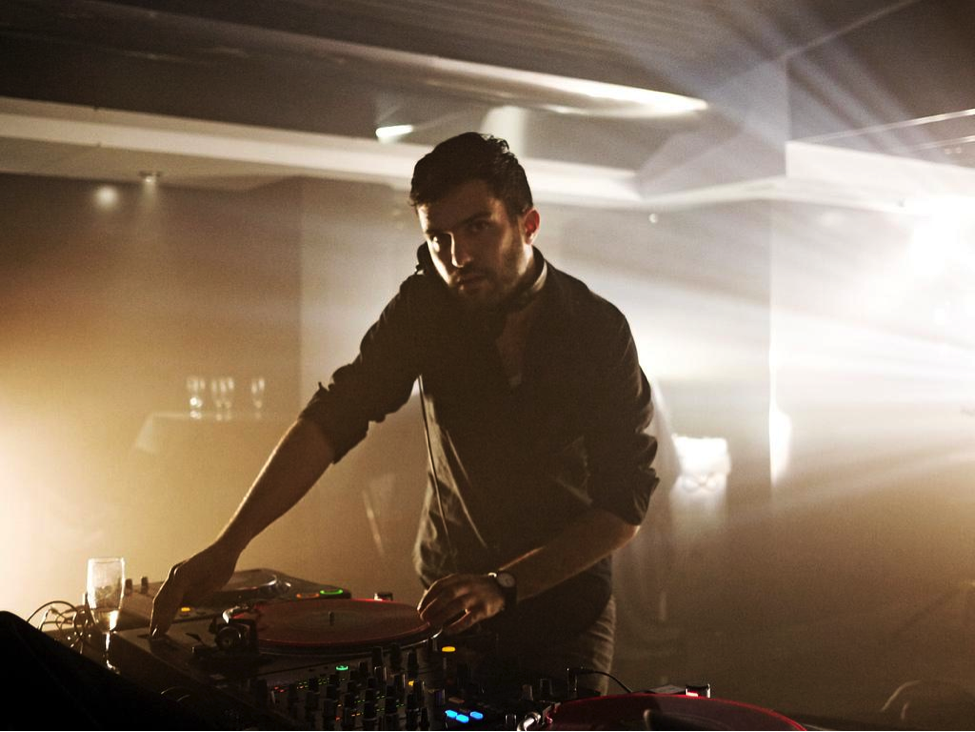A casual glance up on stage at a major festival or reviewing photos from last night’s DJ gigs will reveal a much reviled trend in DJing: the “Jesus Pose”. Often mocked and debated, the Jesus Pose is frequently seen by other DJs as stupid and predictable, yet they continue to exist. Is it possible that the practice might actually provide some benefit and help make superstars’ sets better? As it turns out, there’s solid science to suggest exactly that.
First, words of warning: This is one of my more esoteric and theoretical DJ editorial pieces, so if you think science is lame and that table service rules the world, then by all means skip this one. For those with an open mind and an interest in research, read on!
This article will cover scientific subjects of which I am a hobbiest and no way profess to be an expert. My goal is to introduce you to these concepts in a simple, understandable way that relates to DJing and reference the experts whose research supports these concepts. As always, we greatly appreciate any constructive contributions, or feedback to the concepts in your comments.
THE STRESS CYCLE
 For starters, let’s all agree that DJing live can be a stressful experience. Even for the most experienced road warrior, going on stage can bring up a moderate case of the jitters. Somehow, the best overcome this challenge, rise to the occasion, and play incredible sets every night. It could even be argued that there is one distinguishing factor that separates professionals from the amateurs:
For starters, let’s all agree that DJing live can be a stressful experience. Even for the most experienced road warrior, going on stage can bring up a moderate case of the jitters. Somehow, the best overcome this challenge, rise to the occasion, and play incredible sets every night. It could even be argued that there is one distinguishing factor that separates professionals from the amateurs:
“Consistently delivering a great set, regardless of the conditions”
The pros accomplish this by having a veritable tool belt of activities to cope with changing conditions. In other articles we have covered many of them:
- Setting up your gear efficiently
- Planning your sets for safety
- Taking the right gigs to remove stress
- Knowing how to protect your DJ gear
But one of the most important skills to have might be dealing with nerves and staying in the game mentally. Here’s the typical stress cycle:
- New DJ feels nervous, lacks confidence in his music and/or skills
- Goes on stage and unknowingly projects this belief to the crowd through body language
- The crowd responds to his lack of confidence with a lukewarm response
- This further reenforces the new DJ’s jitters and deflates future confidence
- Commence downward spiraling feedback loop
Playing a great DJ set is often about being relaxed, having fun, and picking great music. How can you possibly expect to do that while nervous and stressed out? It sounds like a typical chicken and the egg question.
How do I gain confidence without having great sets first?
THE SCIENCE OF CONFIDENCE
 In a perfect world, you would convey confidence to the audience – that you belong on stage and believe in the music you’re playing. This will go a long way to keeping the audience open-minded and receptive to new music. Since DJs are often physically far away from the crowd, this comes down to influencing from a distance. In his article for Psychology Today, Joe Navarro (an ex-CIA agent) explains:
In a perfect world, you would convey confidence to the audience – that you belong on stage and believe in the music you’re playing. This will go a long way to keeping the audience open-minded and receptive to new music. Since DJs are often physically far away from the crowd, this comes down to influencing from a distance. In his article for Psychology Today, Joe Navarro (an ex-CIA agent) explains:
“In our posture and faces we can see moods, concerns, fears, and other emotions. We may see neurotic-like behaviors such as nervous ticks or even nervousness”
Much of our projected confidence comes from inside and there are two main hormones in your body which can contribute to stage confidence and your performance:
- The stress hormone (cortisol)
- The confidence hormone (testosterone)
The Mayo Clinic explains:
“Low testosterone may contribute to a decrease in motivation or self-confidence. You may feel sad or depressed, or have trouble concentrating or remembering things”
So if you’re nervous about playing a show, chances are your cortisol is cranking while testosterone is tanking. How do you reverse engineer this process and hack your brain to give you what you’re after? Perhaps the classic phrase: “Fake it till you make it“, might offer some help.
Even if genuinely you’re freaked out and nervous about the coming gig, what if there was some tool to increase testosterone and decrease stress? That’s what brings us back to the Jesus Pose:
STRIKE A POSE
There are several studies that suggest adopting certain kinds of postures can do three critical things:
- Increase testosterone
- Decrease cortisol
- Great increase in external individuals’ confidence in our abilities
In this fantastic TED talk, Amy Cuddy covers her research on how body language and “superman poses” can help calm nerves and get through tough times. Watch it now – or read my summary below:

For those without 20 minutes to watch, I will summarize. Adopting what Cuddy calls “power stances” has a dramatic effect on a body’s chemistry and the perception of us from those around us.
What kind of poses? Well in short: wide, strong stances that take up a lot of space and increase our size. For better or for worse, this goes way back to our day’s as hunter gatherers and the mammalian part of our brain that shares similarities with many other animals. An article on the study writes:
“Cuddy shows that simply holding one’s body in expansive, ‘high-power’ poses for as little as two minutes stimulates higher levels of testosterone (the hormone linked to power and dominance in the animal and human world) and lower levels of cortisol (the ‘stress’ hormone that can, over time, cause impaired immune functioning, hypertension, and memory loss).”
More about the study can be found in this Harvard Business School article on Amy Cuddy’s studies.
PUT IT INTO ACTION!
 Regardless of the science, many of you are probably dead-set against striking a Jesus Pose in the middle of a set. That’s okay, here are a few ways that you can calm your nerves and get started on the right foot before you even start playing:
Regardless of the science, many of you are probably dead-set against striking a Jesus Pose in the middle of a set. That’s okay, here are a few ways that you can calm your nerves and get started on the right foot before you even start playing:
- Take a quiet moment before beginning to visualize yourself playing in a calm, relaxed manner.
- Strike a Superman pose in the bathroom, where no one can see, for two minutes (it will still have a big effect!)
- Have a few songs ready for the beginning of the set that are sure to please the crowd and build your confidence.
- Certainly don’t start your set off with a big, complicated controllerism routine.
During the set, here are some ways to keep the energy going without waving your hands in the air:
- Spread your legs out and adopt a wide, stable stance
- Keep good posture and avoid hunching or hiding
- Establish eye contact with the crowd and avoid only staring at the gear or computer
- Don’t be afraid to spread your gear out and take up space in the booth if possible
- (added) As Jeremy Alisauskas noted in the comments below: dancing is a key DJ skill!
Ean Golden is the founder of Dj TechTools and a worldwide Dj specializing in controllers and new performance technology.
Follow Ean on: Twitter Facebook SoundCloud YouTube










